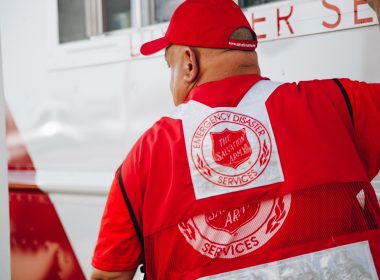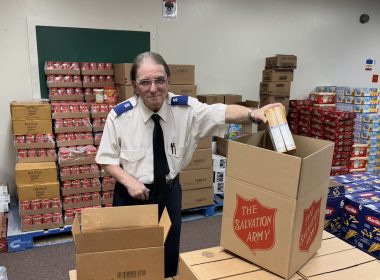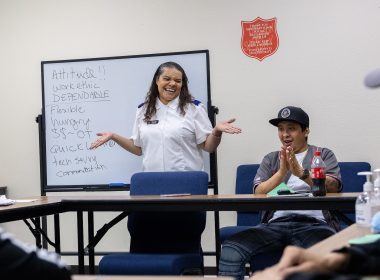BY ROBERT DOCTER –
Editor’s note: The major presentations and summaries of the discussion by conference participants will be presented fully in the next issue of New Frontier.

The territorial commander, Commissioner Linda Bond, and the territorial chief secretary, Lt. Colonel Donald Bell, along with other territorial leaders, assembled divisional commanders, divisional secretaries, and THQ department heads for a Territorial Administrative Leaders Conference (TALC) in Long Beach designed to lead the territory toward actualization of our vision.
With dynamic clarity, motivating inspiration and an abundance of energy, Bond articulated the ingredients necessary to build the infrastructure and move the Army forward through the 21st century. “While we tend to think of ingredients separately, we must never fail to understand that they are each contributing parts of the total mix and that it is the mix that makes the cake. The Army is not simply a group of separate ingredients it’s the batter. The Lord gave us six mission priorities. I will not spend my life working on ten other things.”
The three-day process resulted in wide ranging recommended goals, objectives, action steps and procedures for outcome evaluation. It was clear to the delegates that these steps, when realized, will result in dramatic change in the way we function.
The focus was on “mission” as our purpose our reason for being. Bond reaffirmed Peter Senge’s statement that “a mission defines a direction, not a destination an orientation, not a checklist of accomplishments. Mission explains why we are working together and provides both the aspirations and the fundamental identity of our organization.” For our Army, she noted, our mission underscores how we intend to fulfill our calling. Bond emphasized to the assembled participants that she expected teamwork between those on the field and in headquarters assignments. “All of us willingly accept the mission,” she stated. “The problems are in the bricks, the mortar, and the money. All of us agree on our basic doctrine,” she continued. “Our problems arise over our policies and procedures. This Army is a very large and complex system. To drive it forward, we must develop complex systems that work. We must streamline these systems and communicate them effectively. Our responses to the field must be timely and communicated with a positive tone. Sometimes, we will have to say ‘no’. But we will do it as Christians.”
With strong, yet gentle firmness, Bond identified the style of interaction she expects. “The discussion that goes on in any board meeting is confidential. Points of view and decisions shall not be attached to individuals. It is the board that decides not individuals.
“If you receive correspondence from within the organization that personally diminishes you or that reflects an unprofessional attitude send a copy of it to me. I will handle it, because this is a spiritual leadership problem,” she said resolutely.
Program Secretary Lt. Colonel Ray Moulton, supported by members of the program department staff, began the exploration of the “mission priorities” identified by Bond. He emphasized the incarnational ministry modeled by Christ that led to genuine loving relationships, empowerment and reconciliation between both God and man as well as man to man. There was a clear call for holistic ministry as an essential part of our identity. Eight subgroups identified goals, objectives and action steps.
Major Millie Bearchell of the youth department revealed a pattern of declining statistics within territorial youth programs that can be corrected with increased emphasis and quality relationships. She noted that by the year 2010 there will be over 30 million teenagers in the United States. Ministry to youth must be a strong priority.
Claude Nikondeha, cross cultural ministries director, used charts and graphs to reveal that the areas of significant growth in the territory were in the corps serving ethnic populations. He noted that 11 million people in the Western Territory were born outside the United States and that people from Asia, Africa and Latin America make up over half the population in each of 25 cities in the Western Territory. “Clearly,” he said, “we must cast a global vision.”
Major Paul Seiler, personnel secretary, asked discussion groups to explore and develop action steps around seven specific objectives related to identifying, training and developing leaders for the future.
Business Secretary Lt. Colonel Kurt Burger examined matters pertaining to resources needed to support the mission. Eight committees reported on a number of specific ideas from “living within our means” to “dealing with funding decreases.”
Bond provided a closing devotion focused on one of her biblical heroes, Jehoshaphat, who knew the problems he faced in leading his people were bigger than he was. She used God’s reminder to him to remind the delegates: “Do not be afraid or discouraged, the battle is not yours, but God’s.”
“So,” Bond stated, “like Jehoshaphat–on your face, on your feet, and on the march must be our approach to leadership.”







